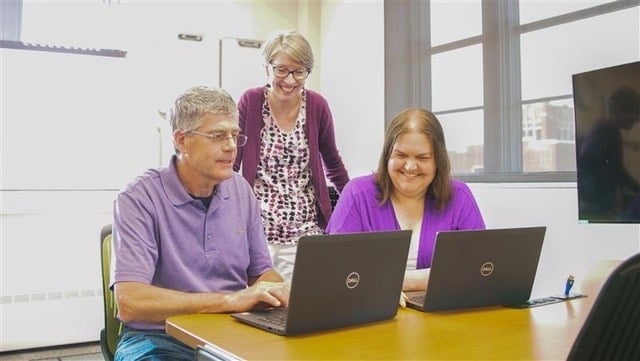You have /5 articles left.
Sign up for a free account or log in.

University of North Dakota faculty members receive support in the Teaching Transformation and Development Academy accessibility lab to make their content accessible for all students.
University of North Dakota
For students with disabilities, coursework can be challenging to complete when it is delivered in an inaccessible manner. The University of North Dakota’s Teaching Transformation and Development Academy (TTaDA) seeks to provide assistive technology to the university community and promote access for all students.
In May, TTaDA opened an Accessibility Lab, in which professors and faculty members can work alongside instructional designers and academic technologists to create accessible content for learners.
What’s the need: UND is making “extensive efforts toward creating a culture of accessibility,” says Dara Faul, associate director of TTaDA. The university has a Campus Accessibility Working Group targeting accessibility initiatives across campus including physical accessibility, assistive technology and employee education on best practices.
To bridge this gap, TTaDA works alongside faculty and staff members to educate them on universal design for learning principles to be incorporated into their work across campus.
How it works: The lab, along with the TTaDA space, is located inside O’Kelly Hall, also home to the communications, history and geography departments.
Inside the lab, six laptops are available with Adobe Acrobat Pro software, which employees can use to make accessible PDFs. Two of the six laptops also have the screen reader Job Access with Speech, which reads content out loud for students with visual impairments.
Support staff in the lab include instructional designers, who teach universal design principles and conduct reviews of courses, and academic technologists, who give insight and trainings on assistive technology, develop websites and suggest solutions.
The lab opened with a Fix Your Content Day event on May 18, drawing in community members to teach them how to use the available software.
The lab complements TTaDA’s already-promoted resources, including a learning management software tool to make content accessible; Anthology Ally, a toolbar add-on for online student learning; Read&Write; and regular workshop offerings for employees.
TTaDA also receives support from the Accessibility for Students office, Title IX office and information technology department for its work, Faul says.
What’s under evaluation: The lab soft launched in the past month, so its impact on the campus community has yet to be demonstrated. Looking ahead, staff will track lab usage and workshop attendance as well as distribute follow-up surveys for those who utilize TTaDA resources, Faul says.
Making faculty and staff members aware of the new resource and having them take advantage of the tools is the first challenge staff hope to overcome.
UND plans to hire an instructional accessibility specialist who will liaise with the Accessibility for Students Office to provide knowledge and expertise with assistive technologies. The specialist will also manage and develop the lab with new technology.
TTaDA will also continue to offer workshops, support for assistive technologies and best practices like editing captioning and transcripts, as well.
Get more content like this directly to your inbox every morning. Subscribe here.
This article has been updated to reflect the current name of the UND disability services office for students.




